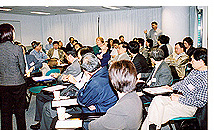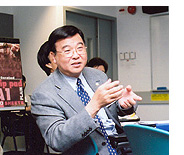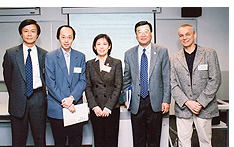EMB delegation explains secondary education reforms
Heading the delegation of six EMB officers, Dr K K Chan , Principal Assistant Secretary (Curriculum Development), spoke of the reasons for the switch from the current "5 + 2" academic structure in secondary education to "3 + 3". The current system puts students to the test with two high stake public examinations during three years, one at form five and the other at form seven level. As a result, the design of the current senior secondary curriculum has been largely examination oriented, essentially tailored to prepare students for admission to university. Also, it prematurely divides students into arts and science streams in their junior years. This is not in line with the aims of education for the 21st century, which are to widen the horizons of students, consolidate their knowledge base, and to train them to be lifelong learners. The new "3 + 3" structure is more aligned with international mainstream education systems. When it is adopted, local universities' undergraduate programmes will have to be extended for one year, i.e., to switch from the current 3-year structure to a 4-year one. The United States and major provincial cities of mainland China adopt a 12-year structure for primary and secondary education and a 4-year structure for tertiary education. The new "3 + 3" structure will thus enable better articulation with education systems outside Hong Kong.
"There will be more learning and less examination," Dr Chan said. The two public examinations, HKCEE and HKALE, will be replaced by one single examination at the end of the 3-year senior education. A flexible curriculum with balanced emphasis on core and elective subjects will be in place. The Curriculum Development Institute under the EMB now proposes Chinese Language, English Language, Mathematics and Liberal Studies be offered as compulsory subjects under the new curriculum. Students are also required to take two elective subjects according to their interests and abilities, and to take career oriented courses. Other learning experiences whether community service, career related, physical or aesthetic, will also be recognized. All these cumulate in the Student Learning Profile, which sums up a student's achievement in all areas -- internal school results for subjects, results in public examinations, levels achieved in career oriented courses, achievement in co-curricular activities, etc.
"The new system calls for a rethinking of our admission interface," said CityU's Vice President (Administration) Professor Y S Wong , also a Member of the Working Group on the Review of the Academic Structure for Senior Secondary Education and Interface with Higher Education that advises the government on implementation of the new system. "In the future, student admission might be coordinated at the faculty rather than academic department level," he added. Professor Wong is also Chairman of the Curriculum Development Council, an advisory body that develops teaching syllabuses recommended for use in primary and secondary schools. Professor Edmond Ko , CityU's Vice President (Undergraduate Education), welcomed the new system, saying that there would be many more young people qualified to apply for university admission, but he expressed concern about whether or not universities are ready to expand their intakes and cater to all. Other staff members, like Dr David Mole , EDO Head, Ms Jean Young, Head of English Language Centre, Dr Mok Ka Ho , Associate Dean of Faculty of Humanities and Social Sciences, Professor K S Chiang , Associate Head of Department of Electronic Engineering, Dr Louis Ma , Associate Head of Department of Information Systems, Ms Pauline Burton , Senior Lecturer of Division of Language Studies, and Professor Benjamin T'sou , Director of Language Information Sciences Research Centre, also voiced their opinions or concerns about the new system from the various aspects of admission interface in universities, teachers' readiness, medium of instruction, and the articulation to Associate Degree programmes. "This is the beginning of a dialogue between the University and EMB on senior secondary and higher education reform," Professor Ko said, rounding off the discussion, "and we will proactively work hand-in-hand with secondary schools to get the kind of students we want to teach."The EMB delegation saw huge potential in CityU's Teachers' Update Course (TUC) for preparing secondary school teachers for the proposed curriculum, especially in the teaching of liberal studies. Offered since 1998, TUC is a professional development programme for secondary school teachers to update their knowledge on subject content and pedagogy. More than 5,000 teachers from hundreds of secondary schools have participated over the past five years. Last year, about 75% of the secondary schools in the JUPAS network had teachers participate in the TUC programme.
The Education Commission put forward the idea of a 3-year senior secondary academic structure in its Reform Proposals for the Education System in Hong Kong published in 2000. While there is no definite time table on implementation, the government expects commencement date for the new structure to be around 2010/11 the earliest.






